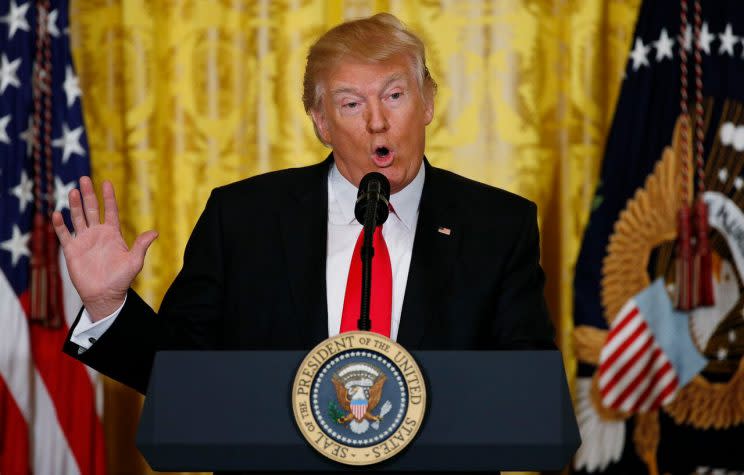Can Trump make good on his pledge to prosecute leaks?
President Trump vowed today to crack down on “low-life leakers” who set in motion the events that led to the firing of his national security adviser, Gen. Mike Flynn. The leakers — also known to journalists as sources — disclosed that Flynn had spoken to the Russian ambassador during the Trump transition about easing sanctions that had been imposed by then-President Barack Obama.
“I’ve actually called the Justice Department to look into the leaks,” Trump said in a lengthy press conference Thursday afternoon, much of it consumed by complaints about the coverage he has received in the media. “Those are criminal leaks.”
The Washington Post reported last week that nine current and former administration officials contested Flynn’s repeated claim that he did not discuss easing sanctions with Russian officials, relying on reports from U.S. intelligence agencies that intercept Russians’ phone calls. Days later, Flynn was forced to resign.
Revealing classified information from intercepted communications is a felony under the Espionage Act, and Trump has indicated that he wants a prosecution of those leaks. Reporting on the information is also a felony under the same law, though courts would likely find that the press is allowed to print the information under the First Amendment.
The Justice Department did not return multiple requests for comment on whether they had opened an investigation into the leaks or received Trump’s request for a probe.
On Twitter, Trump also suggested news outlets that reported the information were culpable. He said the New York Times should “apologize” for printing leaked information, though he didn’t specify which article he was referring to.
When asked about the president’s demand for an apology, Eileen Murphy, a spokeswoman for the New York Times, said the paper is “proud of the work our investigative team does.”
“All this information gets put into the Washington Post and gets put into the New York Times,” Trump said in his press conference, referring to accounts of his calls with the leaders of Australia and Mexico. “And I’m saying, ‘What’s going to happen when I’m dealing on the Middle East? What’s going to happen when I’m dealing with really, really important subjects like North Korea?’ We’ve got to stop it. That’s why it’s a criminal penalty.”
Bradley Moss, a Washington lawyer specializing in national security issues, said he believes Trump would not take the risk of attempting to prosecute a journalist for reporting leaks since that would likely violate the press’ First Amendment protections. The federal government has not prosecuted a reporter under the Espionage Act since World War II.
Prosecuting the leakers, however, is far likelier. The Justice Department could use the Espionage Act to charge that the administration official had leaked national defense information. A claim that leaking the information was in the public’s interest would not constitute a defense, although it could be used to argue for a more lenient sentence. The Obama White House used the Espionage Act to go after leakers more than any other administration.

However, it’s likely that the officials were careful in how they spoke to journalists, using encrypted messaging apps to avoid leaving tracks, Moss speculated.
“Unless someone made a major slip-up and exposed themselves as the source of the leak, it will be difficult to track them down,” Moss said.
Any prosecution of leaks would ultimately come under the purview of recently confirmed Attorney General Jeff Sessions. In 2013, when he was a senator, Sessions argued against a bill that would have protected reporters’ confidential sources and has taken strong stands against leaking of national security information.
“Freedom of the press allows the press to publish freely, and it guarantees that,” he said. “It does not guarantee the press the ability to aid and abet, to conspire with government officials to leak sensitive information that’s classified.”
During Sessions’ confirmation hearing, Sen. Amy Klobuchar of Minnesota asked him if he agreed with the Obama administration Justice Department regulations urging the department to avoid prosecuting reporters. He said he had not had a chance to review the new regulations but, “for the most part, there is a broadly recognized and proper deference to the news media.”
He added, “But you could have a situation in which a media is not really the unbiased media we see today, and they could be a mechanism through which unlawful intelligence is obtained.”
Gregg Leslie, legal defense director of the Reporters Committee for Freedom of the Press, said his organization is concerned that journalists could be prosecuted under the Espionage Act, but he doubts that the courts would uphold any of those prosecutions. More likely is that a journalist would be subpoenaed to testify about his or her sources. If the reporter refuses, he or she could be charged with contempt or other crimes.
Leslie was also troubled by Trump’s demand that the Times apologize for reporting accurately on confidential information the government did not want the people to know.
“There’s no way they should apologize for accepting and printing leaked information,” Leslie said. “The American people deserve that. We need to know what’s really going on, not just what the White House press office says is happening.”
Read more from Yahoo News:



